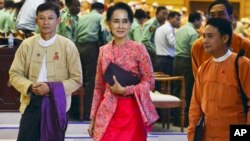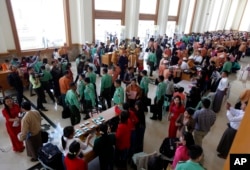The United States has congratulated the newly elected members of Myanmar's parliament as they took seats on the first day of the country's new “Union Parliament.”
“This outcome is a testament to the courage and sacrifice shown by the people of Burma [Myanmar] over many years, including more than 100 former political prisoners who will now take their seats in Burma's parliament,” said State Department spokesperson John Kirby Monday.
As the democratically elected parliament convened its first session, impediments still remain to “the realization of a full democratic and civilian government,” added Kirby. but he said the U.S. is “encouraged by the commitment of Burma's political leaders to work together in the spirit of national unity and reform.”
New members of Myanmar's parliament, most dressed in traditional garb, took a joint oath of office Monday in the capital, Naypyidaw, as the prelude to installing the country's first democratically elected government in more than half a century.
"This is the first really concrete institutional transition of what the elections have produced and the expression of the will of the people," said European Union Ambassador Roland Kobia, who observed the brief swearing-in ceremony.
Who will become Myanmar's president, succeeding retired general Thein Sein, is still a mystery.
The most popular choice, National League for Democracy (NLD) leader Aung San Suu Kyi, whose party captured 80 percent of the parliamentary seats in the November 8 election, is barred by the constitution from the presidency.
Myanmar's political circles are rife with speculation that she is negotiating with the still-powerful military, which automatically retains one-fourth of the parliamentary seats, to agree to suspend the clause preventing the Nobel Peace Prize laureate from the top job.
"It should be Daw Aung San Suu Kyi," NLD lawmaker Thet Thet Kine, a prominent female entrepreneur, told VOA. "… She should be the one leading the country.”
Presidential nominees
The parliament this month will ultimately select the president from three vice presidential nominees put forward by the elected lower house representatives, the upper house elected representatives and the unelected army representatives.
No dates have been announced for the parliamentary procedures, although nothing significant will occur until after the speaker of the upper house is chosen before moving on to selection of the vice presidents.
"We will need to amend or revoke existing laws [that] are not in line with democratic practices, human rights criteria, that conflict with international agreements and treaties or those unable to protect the lives and security of civilians," the newly elected lower house speaker, Win Myint of the NLD, said in his inaugural speech Monday.
Thein Sein and the military have pledged a smooth transition of power.
"We are on time. Deadlines have been respected. No major crisis. I think it's a job very well done, so far," Kobia told VOA.
NLD officials whom VOA has contacted in recent days have kept mum on speculation that negotiations are under way with military leaders to convince them to persuade the unelected army lawmakers to join a vote to suspend Section 59(f) of the constitution.
The clause states that a presidential candidate must be a citizen, be born of parents who are both Myanmar citizens, and cannot have a foreign spouse or children. It effectively bars Aung San Suu Kyi, whose two sons are British citizens.
The clause should not be changed "for the goodness of the mother country," according to an article Monday in the army's Myawaddy Daily newspaper.
The NLD leader has previously said she will be "above the presidency," but has neither elaborated nor indicated whom she prefers to take the office.
Local history of instability
Aung San Suu Kyi, who spent years under house arrest, is the daughter of independence hero Aung San. He was assassinated in 1947, six months before the independence of Burma, which had been under British colonial rule.
The country's military has governed directly or indirectly since 1962, when it seized power after years of instability under civilian rule.
Last year's landslide victory for the NLD came 25 years after the party comfortably won a national election – only to see the results annulled by the military.
The military-backed Union Solidarity and Development Party won an election in 2010, which the NLD boycotted.







